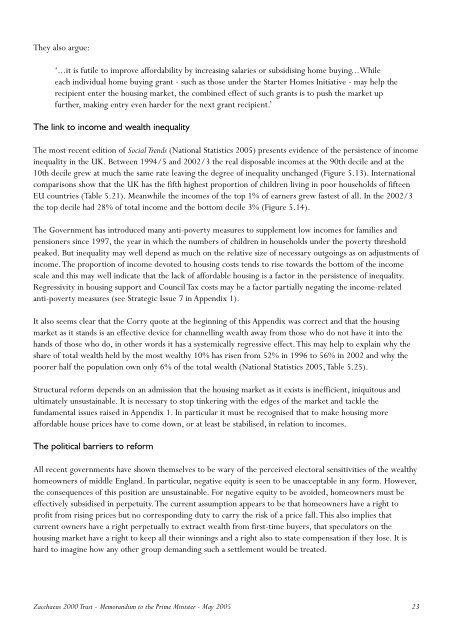Memorandum-to-the-Prime-Minister-on-Unaffordable-Housing
Memorandum-to-the-Prime-Minister-on-Unaffordable-Housing
Memorandum-to-the-Prime-Minister-on-Unaffordable-Housing
You also want an ePaper? Increase the reach of your titles
YUMPU automatically turns print PDFs into web optimized ePapers that Google loves.
They also argue:<br />
‘...it is futile <str<strong>on</strong>g>to</str<strong>on</strong>g> improve affordability by increasing salaries or subsidising home buying...While<br />
each individual home buying grant - such as those under <str<strong>on</strong>g>the</str<strong>on</strong>g> Starter Homes Initiative - may help <str<strong>on</strong>g>the</str<strong>on</strong>g><br />
recipient enter <str<strong>on</strong>g>the</str<strong>on</strong>g> housing market, <str<strong>on</strong>g>the</str<strong>on</strong>g> combined effect of such grants is <str<strong>on</strong>g>to</str<strong>on</strong>g> push <str<strong>on</strong>g>the</str<strong>on</strong>g> market up<br />
fur<str<strong>on</strong>g>the</str<strong>on</strong>g>r, making entry even harder for <str<strong>on</strong>g>the</str<strong>on</strong>g> next grant recipient.’<br />
The link <str<strong>on</strong>g>to</str<strong>on</strong>g> income and wealth inequality<br />
The most recent editi<strong>on</strong> of Social Trends (Nati<strong>on</strong>al Statistics 2005) presents evidence of <str<strong>on</strong>g>the</str<strong>on</strong>g> persistence of income<br />
inequality in <str<strong>on</strong>g>the</str<strong>on</strong>g> UK. Between 1994/5 and 2002/3 <str<strong>on</strong>g>the</str<strong>on</strong>g> real disposable incomes at <str<strong>on</strong>g>the</str<strong>on</strong>g> 90th decile and at <str<strong>on</strong>g>the</str<strong>on</strong>g><br />
10th decile grew at much <str<strong>on</strong>g>the</str<strong>on</strong>g> same rate leaving <str<strong>on</strong>g>the</str<strong>on</strong>g> degree of inequality unchanged (Figure 5.13). Internati<strong>on</strong>al<br />
comparis<strong>on</strong>s show that <str<strong>on</strong>g>the</str<strong>on</strong>g> UK has <str<strong>on</strong>g>the</str<strong>on</strong>g> fifth highest proporti<strong>on</strong> of children living in poor households of fifteen<br />
EU countries (Table 5.21). Meanwhile <str<strong>on</strong>g>the</str<strong>on</strong>g> incomes of <str<strong>on</strong>g>the</str<strong>on</strong>g> <str<strong>on</strong>g>to</str<strong>on</strong>g>p 1% of earners grew fastest of all. In <str<strong>on</strong>g>the</str<strong>on</strong>g> 2002/3<br />
<str<strong>on</strong>g>the</str<strong>on</strong>g> <str<strong>on</strong>g>to</str<strong>on</strong>g>p decile had 28% of <str<strong>on</strong>g>to</str<strong>on</strong>g>tal income and <str<strong>on</strong>g>the</str<strong>on</strong>g> bot<str<strong>on</strong>g>to</str<strong>on</strong>g>m decile 3% (Figure 5.14).<br />
The Government has introduced many anti-poverty measures <str<strong>on</strong>g>to</str<strong>on</strong>g> supplement low incomes for families and<br />
pensi<strong>on</strong>ers since 1997, <str<strong>on</strong>g>the</str<strong>on</strong>g> year in which <str<strong>on</strong>g>the</str<strong>on</strong>g> numbers of children in households under <str<strong>on</strong>g>the</str<strong>on</strong>g> poverty threshold<br />
peaked. But inequality may well depend as much <strong>on</strong> <str<strong>on</strong>g>the</str<strong>on</strong>g> relative size of necessary outgoings as <strong>on</strong> adjustments of<br />
income.The proporti<strong>on</strong> of income devoted <str<strong>on</strong>g>to</str<strong>on</strong>g> housing costs tends <str<strong>on</strong>g>to</str<strong>on</strong>g> rise <str<strong>on</strong>g>to</str<strong>on</strong>g>wards <str<strong>on</strong>g>the</str<strong>on</strong>g> bot<str<strong>on</strong>g>to</str<strong>on</strong>g>m of <str<strong>on</strong>g>the</str<strong>on</strong>g> income<br />
scale and this may well indicate that <str<strong>on</strong>g>the</str<strong>on</strong>g> lack of affordable housing is a fac<str<strong>on</strong>g>to</str<strong>on</strong>g>r in <str<strong>on</strong>g>the</str<strong>on</strong>g> persistence of inequality.<br />
Regressivity in housing support and Council Tax costs may be a fac<str<strong>on</strong>g>to</str<strong>on</strong>g>r partially negating <str<strong>on</strong>g>the</str<strong>on</strong>g> income-related<br />
anti-poverty measures (see Strategic Issue 7 in Appendix 1).<br />
It also seems clear that <str<strong>on</strong>g>the</str<strong>on</strong>g> Corry quote at <str<strong>on</strong>g>the</str<strong>on</strong>g> beginning of this Appendix was correct and that <str<strong>on</strong>g>the</str<strong>on</strong>g> housing<br />
market as it stands is an effective device for channelling wealth away from those who do not have it in<str<strong>on</strong>g>to</str<strong>on</strong>g> <str<strong>on</strong>g>the</str<strong>on</strong>g><br />
hands of those who do, in o<str<strong>on</strong>g>the</str<strong>on</strong>g>r words it has a systemically regressive effect.This may help <str<strong>on</strong>g>to</str<strong>on</strong>g> explain why <str<strong>on</strong>g>the</str<strong>on</strong>g><br />
share of <str<strong>on</strong>g>to</str<strong>on</strong>g>tal wealth held by <str<strong>on</strong>g>the</str<strong>on</strong>g> most wealthy 10% has risen from 52% in 1996 <str<strong>on</strong>g>to</str<strong>on</strong>g> 56% in 2002 and why <str<strong>on</strong>g>the</str<strong>on</strong>g><br />
poorer half <str<strong>on</strong>g>the</str<strong>on</strong>g> populati<strong>on</strong> own <strong>on</strong>ly 6% of <str<strong>on</strong>g>the</str<strong>on</strong>g> <str<strong>on</strong>g>to</str<strong>on</strong>g>tal wealth (Nati<strong>on</strong>al Statistics 2005,Table 5.25).<br />
Structural reform depends <strong>on</strong> an admissi<strong>on</strong> that <str<strong>on</strong>g>the</str<strong>on</strong>g> housing market as it exists is inefficient, iniqui<str<strong>on</strong>g>to</str<strong>on</strong>g>us and<br />
ultimately unsustainable. It is necessary <str<strong>on</strong>g>to</str<strong>on</strong>g> s<str<strong>on</strong>g>to</str<strong>on</strong>g>p tinkering with <str<strong>on</strong>g>the</str<strong>on</strong>g> edges of <str<strong>on</strong>g>the</str<strong>on</strong>g> market and tackle <str<strong>on</strong>g>the</str<strong>on</strong>g><br />
fundamental issues raised in Appendix 1. In particular it must be recognised that <str<strong>on</strong>g>to</str<strong>on</strong>g> make housing more<br />
affordable house prices have <str<strong>on</strong>g>to</str<strong>on</strong>g> come down, or at least be stabilised, in relati<strong>on</strong> <str<strong>on</strong>g>to</str<strong>on</strong>g> incomes.<br />
The political barriers <str<strong>on</strong>g>to</str<strong>on</strong>g> reform<br />
All recent governments have shown <str<strong>on</strong>g>the</str<strong>on</strong>g>mselves <str<strong>on</strong>g>to</str<strong>on</strong>g> be wary of <str<strong>on</strong>g>the</str<strong>on</strong>g> perceived elec<str<strong>on</strong>g>to</str<strong>on</strong>g>ral sensitivities of <str<strong>on</strong>g>the</str<strong>on</strong>g> wealthy<br />
homeowners of middle England. In particular, negative equity is seen <str<strong>on</strong>g>to</str<strong>on</strong>g> be unacceptable in any form. However,<br />
<str<strong>on</strong>g>the</str<strong>on</strong>g> c<strong>on</strong>sequences of this positi<strong>on</strong> are unsustainable. For negative equity <str<strong>on</strong>g>to</str<strong>on</strong>g> be avoided, homeowners must be<br />
effectively subsidised in perpetuity.The current assumpti<strong>on</strong> appears <str<strong>on</strong>g>to</str<strong>on</strong>g> be that homeowners have a right <str<strong>on</strong>g>to</str<strong>on</strong>g><br />
profit from rising prices but no corresp<strong>on</strong>ding duty <str<strong>on</strong>g>to</str<strong>on</strong>g> carry <str<strong>on</strong>g>the</str<strong>on</strong>g> risk of a price fall.This also implies that<br />
current owners have a right perpetually <str<strong>on</strong>g>to</str<strong>on</strong>g> extract wealth from first-time buyers, that specula<str<strong>on</strong>g>to</str<strong>on</strong>g>rs <strong>on</strong> <str<strong>on</strong>g>the</str<strong>on</strong>g><br />
housing market have a right <str<strong>on</strong>g>to</str<strong>on</strong>g> keep all <str<strong>on</strong>g>the</str<strong>on</strong>g>ir winnings and a right also <str<strong>on</strong>g>to</str<strong>on</strong>g> state compensati<strong>on</strong> if <str<strong>on</strong>g>the</str<strong>on</strong>g>y lose. It is<br />
hard <str<strong>on</strong>g>to</str<strong>on</strong>g> imagine how any o<str<strong>on</strong>g>the</str<strong>on</strong>g>r group demanding such a settlement would be treated.<br />
Zacchaeus 2000 Trust - <str<strong>on</strong>g>Memorandum</str<strong>on</strong>g> <str<strong>on</strong>g>to</str<strong>on</strong>g> <str<strong>on</strong>g>the</str<strong>on</strong>g> <str<strong>on</strong>g>Prime</str<strong>on</strong>g> <str<strong>on</strong>g>Minister</str<strong>on</strong>g> - May 2005 23


